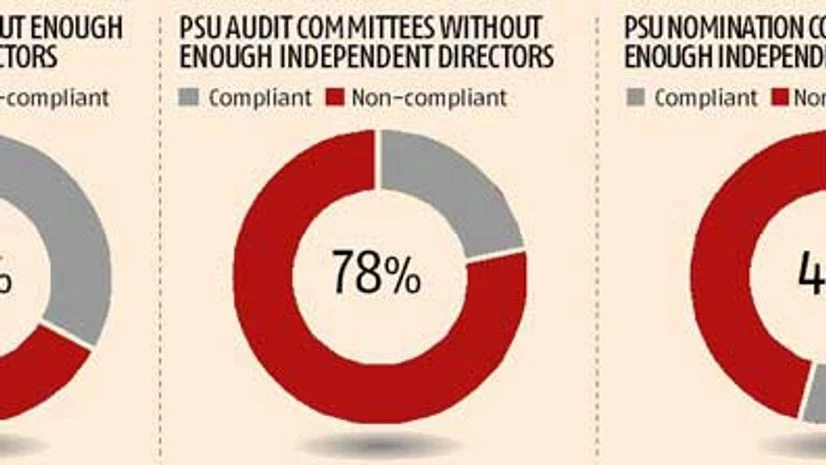Presenting the Budget for 2016-17, Finance Minister Arun Jaitley said: "Public shareholding in government-owned companies is a means of ensuring higher levels of transparency and accountability. To promote this objective, the general insurance companies owned by the government will be listed in the stock exchanges."
Do listings really achieve this objective for public sector undertakings (PSU)? Let us look at the ground realities to answer this and begin by looking at the boards.
It was decided that all listed entities must each have at least one woman director. Even after an extended deadline was over last March, half the PSUs did not have any women directors. The PSUs defended themselves saying the parent ministry had just not signed up to fill the vacancies.
A study from just six months ago showed that 31 out of 46 listed PSU boards did not have adequate representation of independent directors. A consequence of not having the full board is not being in a position to constitute the audit committee or the remuneration committee. PSUs are not compliant here either.
Turn next to corporate social responsibility (CSR). Under the Companies Act, 2013, companies must spend two per cent of their average profit before tax of the preceding three years on CSR. According to the guidelines of the Department of Public Enterprises , PSUs have been required to spend on CSR since 2010. Yet, of the CSR spends by S&P BSE 100 companies in FY13, non-PSUs spent one per cent of their requisite profits while PSUs spent just 0.6 per cent.
This trend continued in FY15. CSR spends by the S&P BSE 100 companies aggregated 1.5 per cent of the requisite profits. Non-PSUs spent 1.6 per cent and the 21 PSUs spent 1.3 per cent of their requisite profit, respectively. Given that PSUs had a head start, they should have been in a better position to scale up their CSR activities.
Buy-backs, cross holdings, placements without committing to lock-ups... I can go on, but most actions show apathy to what markets value.
Markets have their own rhythms and practices, rewards and retributions, with all this getting baked into the share price. Consequently, for a PSU, the act of listing can be particularly challenging. The focus shifts from a five-year view to a quarterly one, with expectations about performance changing overnight. Performance is now measured against domestic and global peers. These listed companies are also expected to comply with the same listing rules that apply to other listed companies. Not being in control of what most view as routine processes is difficult to understand. PSUs requiring to seek guidance/ approval from their parent ministry, that is, the government, to comply with a law which the government itself has enacted, just does not add up.
But while the market may see listing as a great divide that should change behaviour, for those steering a PSU from the ministry, accountability has not changed. The ministry and the listed PSUs are still accountable to Parliament, with the ministry remaining in the direct line of fire. Consequently, market expectations and the rules of the Securities and Exchange Board of India are a distraction compared to taking political heat from Parliament. If Parliament holds the ministry accountable, the ministry sees it as its job to provide oversight and guidance to the management. Thus, the national policy agenda often supersedes the need for investor returns.
To those in the ministry then, PSU boards can at best serve only as sounding boards. They need to appoint a chief executive officer who will not rock the boat. Also, as remuneration is fixed according to the government pay scales, the appointments and remuneration committee is not needed. And if the focus has to be on the audit of the Comptroller and Auditor General of India, not on the findings of the audit committees, surely they can be done away with. From their perspective, why this fuss?
A story that I once heard - although I am not sure how true it is - risks repeating. DBS started life as a government-owned development bank. It was partially privatised and set on a path of commercialisation. But Lee Kuan Yew was not satisfied. Later in life he was invited on to some boards, including that of a US bank, and found it an eye-opening experience. He realised that Singapore's banks were too small and too parochial in their management and governance. He wasn't satisfied with Singapore's banks being second- or third-rate; he wanted them - led by DBS - to become world-class. So he pushed for more foreign bankers on the board and in senior management positions to bring in the expertise that DBS needed.
This brings me back to listing the general insurance companies.
The act of listing can be transformative. To do so successfully, government as shareholder and the companies must both be clear about the objectives and expectations. Only then must they make this leap. But even if both of them accept that listing is a euphemism for fund-raising, they must appreciate that public shareholders have expectations regarding governance standards. On this investors must not be short-changed.
The writer works with Institutional Investor Advisory Services of India Limited. The views are personal
Disclaimer: These are personal views of the writer. They do not necessarily reflect the opinion of www.business-standard.com or the Business Standard newspaper

)
